The New College Challenge Launch: A Week of On-Campus Conversations About Resilience
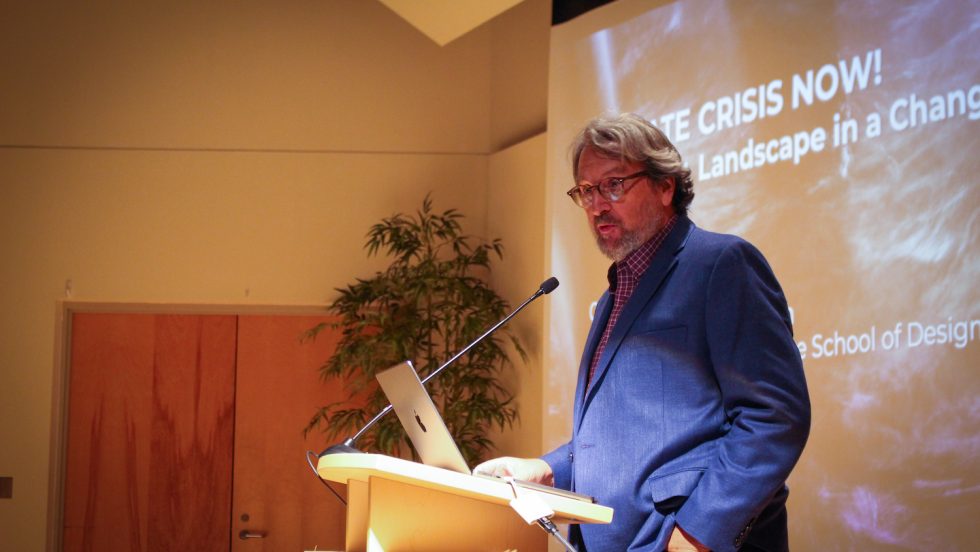
The series began with a kickoff brunch on Tuesday morning under the bayfront tent, during which New College President Okker, Ph.D. introduced the crowd to the unifying, year-long initiative that is The New College Challenge.
The Challenge, she explained, was designed to bring together students, experts and leaders from top universities and industries who will work to address the challenges facing our region and world today. The initiative was modeled after two endeavors in the Northeast: “Envision Resilience: Nantucket Challenge” and “Envision Resilience: Narragansett Bay.”
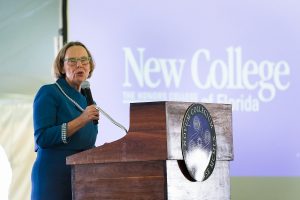
“New College can play a key role in retaining top talent for our state. The New College Challenge is our vehicle to get us there,” Okker said. “The design teams we’ve invited will help us find new and fresh ways to improve our infrastructure, to ensure that our campus supports our students. The relationships with employers, community members and other academic institutions we are developing through The Challenge will ensure the very resilience of New College.”
And the launch of The New College Challenge—with its series of discussions about protecting coastal campuses and communities—could not have arrived at a more critical time. Less than a month ago, Southwest Florida experienced the devastating effects of Hurricane Ian, prompting locals to reimagine how to better safeguard against future environmental impacts.
Throughout The Challenge, New College will become a community incubator for brainstorming new ideas and solutions about the future. New College has already enlisted experts from Harvard, Yale, the University of Florida, the University of South Florida, Kean University, Syracuse University and the University of Miami to lend their unique perspectives.
Tuesday Kickoff
The Tuesday kickoff event welcomed three expert panelists to discuss the topic of resilience, moderated by DreamLarge Founder Anand Pallegar.
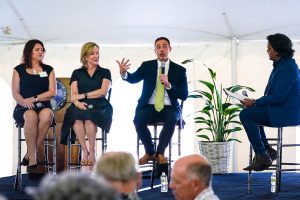
The panelists were: Taryn Sabia, an associate professor of research at the University of South Florida and the co-founder of the urban design collaborative, Urban Charrette, Inc.; Teri Hansen, the president and CEO of Charles & Margery Barancik Foundation; and Kevin O’Farrell, Ph.D., the chancellor for the Florida Department of Education’s Division of Career and Adult Education.
“[The New College Challenge] is an opportunity for knowledge exchange,” Sabia said, to which Hanson added, “New College has the opportunity to be the academic and intellectual epicenter of our community.”
Special guest William Dudley, a New College alumnus and the former president/CEO of the Federal Reserve Bank of New York, also discussed the topic of “resilience” from an economic/financial perspective.
Wednesday Lecture
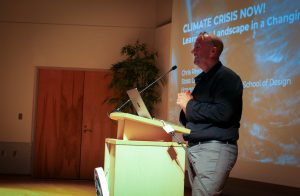
On Wednesday evening in Mildred Sainer Pavilion, resilience was addressed in a “New Topics” lecture entitled “Climate Crisis Now! Learning and Landscapes in a Changing Environment.” Speaker Chris Reed, a professor at Harvard University and the founding director of STOSS Landscape Urbanism, shared his ambitious vision to be climate-ready in order to protect coastlines.
“Campus must be designed both for the ever-changing nature of landscapes and the environment, and for its own inherent social development,” Reed began, “weaving…programming needs, institutional alignments, environmental sustainability and maintenance considerations with equity and social justice imperatives.”
Friday Symposium
And all day on Friday in the bayfront tent, crowds converged for the “Designing for Resilience” Symposium on coastal resilience and adaptive strategies. Big questions were posed, such as “How can we design more resilient communities in the face of coastal threats like storm surge?” National experts presented case studies and research relevant to the Gulf Coast, and input from the community offered direction for their ongoing work.
David Brain, Ph.D.—a professor of sociology and the director of the Urban Studies Program at New College—moderated two panel discussions.
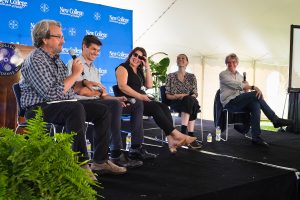
“It’s not just about getting the solutions right; it’s about figuring out what the real questions are,” Brain said of The Challenge. “That’s what we’re learning through this process.”
To this end, Amber Whittle, Ph.D., the executive director of Southface Sarasota, spoke about Southwest Gulf Coast resilience.
Heritage Conservation Specialist Marty Hylton moderated a panel about the “Envision Resilience Challenge: Nantucket and Narragansett” with ReMain Nantucket Executive Director Cecil Barron Jensen and Project Manager Claire Martin; as well as Carolyn Cox, executive director of the Florida Climate Institute; and Bob Miklos, founder of designLAB architects.
Several higher education leaders gave a series of “Designing for Resilience” presentations, including Sabia; Alan Plattus, professor and founding director of the Urban Design Workshop at Yale University; David Mohney, dean of the Michael Graves College, Architecture and Design, at Kean University; Jeff Carney, associate professor in the School of Architecture at the University of Florida; Ted Brown, professor in the School of Architecture at Syracuse University; and Sonia Chao, research assistant professor and director of the Center for Urban & Community Design at the University of Miami.
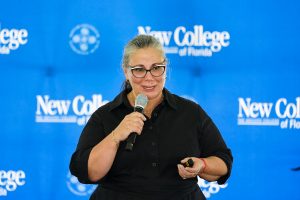
Chao discussed her experience with Hurricane Andrew in 1992 and how it impacted her perspective on rebuilding along the coast after natural disasters.
“That moment really changed the rest of my trajectory,” Chao said about shifting her career toward addressing resilience. “How can we build more resiliently? That takes an envisioning process, and that process entails community conversations.”
There will be many more of these conversations over the course of the year.
For more information on The New College Challenge, visit ncf.edu/challenge.
